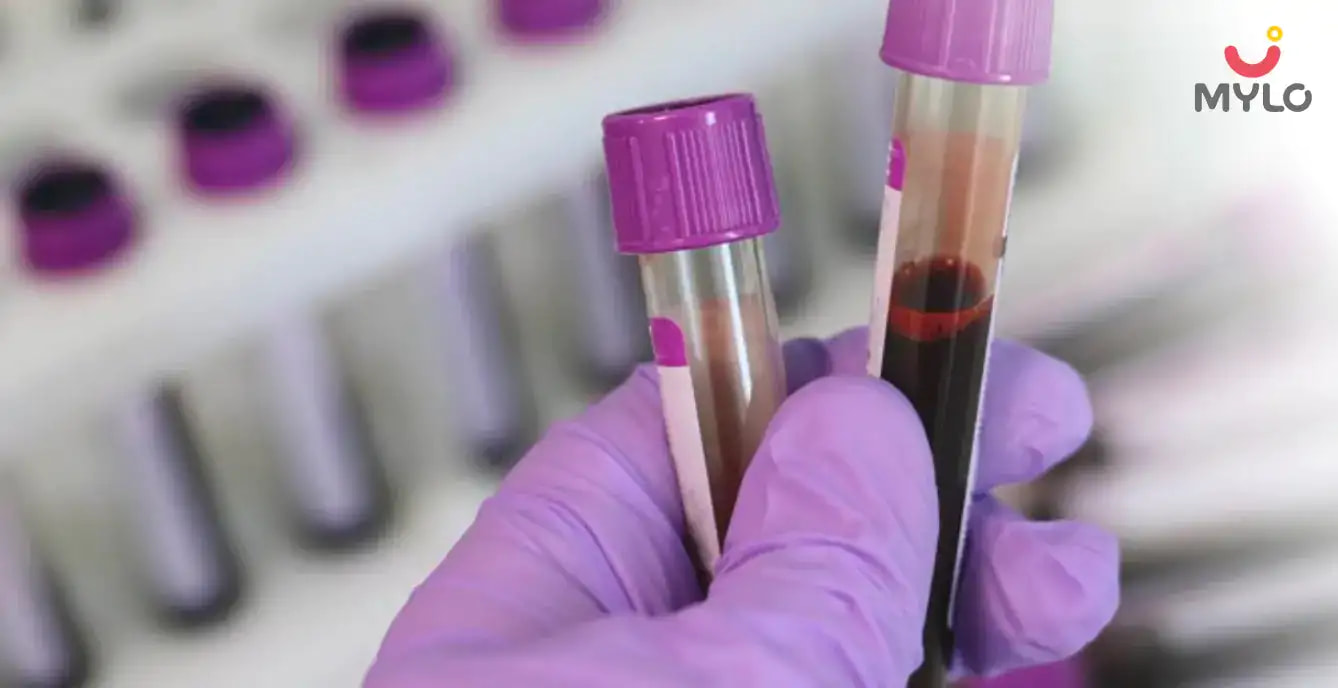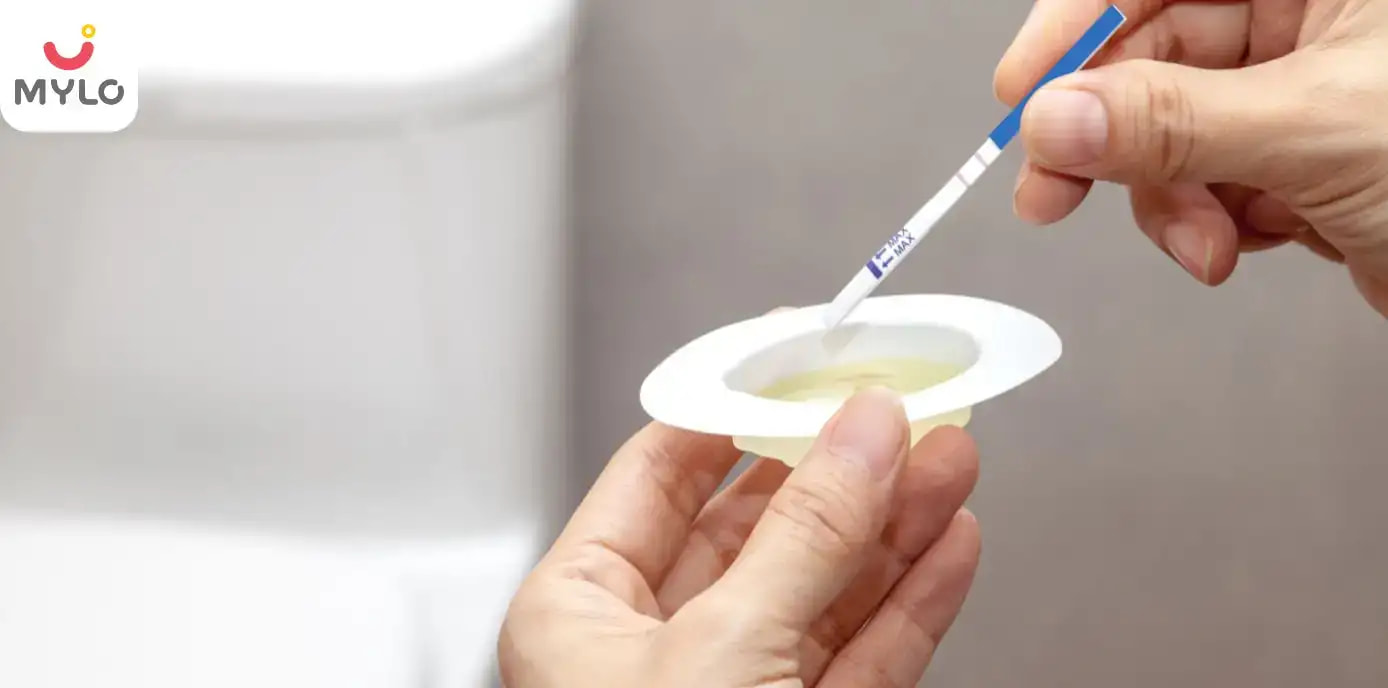Home

Scans & Tests

Blood Beta-hCG Test: What Is It, Levels & How to Read It?
In this Article

Scans & Tests
Blood Beta-hCG Test: What Is It, Levels & How to Read It?
Updated on 3 November 2023
Suppose you are a woman who has been planning to have a child for a long time but can't wait for the pregnancy test kit to show you the results and are looking for something magical to give you the good news sooner well. In that case, there is one test that can help you detect pregnancy, usually within 10-12 days of conception! Which test is it? It is called the Blood Beta HCG test!
What Is HCG?
Proteins, hormones, and other substances in your body help determine whether you're healthy or unhealthy. Abnormalities in blood, such as high or low amounts of a tiny hormone, might have serious repercussions. HCG can detect various abnormalities and growths in the body, including tumours.
Human Chorionic Gonadotropin (HCG) is a hormone whose presence confirms a woman's pregnancy or if the baby inside has any kind of congenital disabilities. It also indicates if the reason behind the tumour is related to the hormone HCG.
In most cases, HCG levels let a doctor determine whether or not a woman has any abnormal growths resulting from abnormalities in the egg or sperm.
What is Blood Beta HCG Test?
Blood Beta HCG Test is a blood test that evaluates the concentration of human chorionic gonadotropin (HCG). An elevated amount of this hormone, produced as early as 10 days after conception, can prove pregnancy.
It can also be used to evaluate fertility treatments (synthetic HCG hormone is occasionally used to assist mature follicles and promote ovulation) and when there is a worry that anything could be amiss with a pregnancy.
Types of HCG Blood Tests
There are two ways in which a beta HCG test for pregnancy is performed- A urine test and a Blood test. The hCG blood tests can be divided into:
HCG Quantitative Test
An HCG Quantitative Test will help you know the exact quantity of HCG hormone in your blood. This test can also be referred to as Repeat Quantitative HCG Test or Quantitative Pregnancy Blood Test. This test could also help diagnose a few types of cancers but rare cases. The blood test guarantees that pregnant women do not undergo any treatments that could harm the foetus, such as X-Rays, MRIs, and Spinal testing.
Analysing the HCG levels in your blood can assist identify any issues, such as an impending miscarriage or an ectopic pregnancy. Indeed, HCG Quantitative blood tests can estimate the child's age and identify disorders like Down syndrome or Edwards syndrome.
HCG Qualitative Blood Test
In contrast to the HCG Quantitative test, this test will tell if there is any amount of HCG hormone present in your blood at all. An HCG Qualitative blood test will not inform you about your blood's exact quantity of HCG. This is usually done before HCG Quantitative test and is usually the first step in confirming pregnancy. Here are a few other names by which HCG Qualitative test is known:
- HCG Blood Beta Serum- Qualitative
- Qualitative Blood Serum Test HCG
- HCG Serum, Qualitative
HCG Urine Test
Human chorionic gonadotropin urine testing is primarily used to screen for pregnancy. A fertilised egg attaches to the uterine wall about 10 days after conception, triggering a shift in hormone levels. An initial urine sample is taken to determine whether the woman is expecting. It is common for HCG-based pregnancy kits to be available at home. A blood test is significantly more accurate than a urine or stool test, and these tests are known to produce inaccurate findings.
This test can only give you results post one or two weeks after the egg fertilises. You can consider the HCG urine test similar to qualitative blood HCG as it only shows the presence of the HCG hormone but doesn't clarify the exact quantity of the same.
When Are Blood Beta HCG Tests Used?
If you have already confirmed pregnancy using the pregnancy test kit or if you want to confirm pregnancy within 10-12 days of conception, you can do so by getting a beta HCG test done when you go to your doctor. However, regular pregnancies do not necessitate the use of the beta HCG test results. Many practitioners employ transvaginal ultrasound to see the pregnancy (the gestational sac) instead at your regular pregnancy confirmation visits.
One good thing about beta HCG test for pregnancy is that it can detect pregnancy complications such as miscarriages. If this is the case, your doctor will repeat these tests once every two-four days to check the speed at which the hCG levels rise.
The pace of increase rather than the actual amount of hormone in the blood is more telling early in pregnancy. A high likelihood of miscarriage may be indicated by HCG levels that grow slowly.
Your doctor may order a blood beta-HCG test before or during your next menstrual cycle to evaluate if your fertility treatment was successful. HCG injections used to increase the odds of conception or as part of intrauterine insemination (IUI or IVF) must be carefully timed to ensure that the medication has cleared the body and does not interfere with the test results of women undergoing IVF or IUI.
Following are the other abnormalities that the beta HCG test can detect:
- Tumours in ovaries.
- Molar pregnancies.
- Congenital disabilities, if any, in your baby.
- Ectopic pregnancy.
- Urinary tract tumours.
- Tumours along the uterine wall.
- Multiple pregnancies.
Levels Of Beta HCG Tests
A weekly breakdown of HCG levels throughout pregnancy is provided in the below chart. HCG levels can rise and decline dramatically during the second half of the pregnancy, as shown in the figure below. The following is a typical week-by-week chart during the first trimester of pregnancy:
|
3 weeks |
5-50 mIU/cc |
|
4 weeks |
4-426 mIU/cc |
|
5 weeks |
19-7,340 mIU/cc |
|
6 weeks |
1,080-56,500 mIU/cc |
|
7 – 8 weeks |
7,650-229,000 mIU/cc |
|
9 – 12 weeks |
25,700-288,000 mIU/cc |
|
13 – 16 weeks |
13,300-254,000 mIU/cc |
|
17 – 24 weeks |
4,060-165,400 mIU/cc |
|
25 – 40 weeks |
3,640-117,000 mIU/cc |
Note:
- High and low levels of HCG hormone in your blood are not final indicators of whether your pregnancy will be healthy or not. A healthy pregnancy can occur even whether your progesterone levels are high or low. Due to various variables affecting total HCG levels, such as maternal smoking or BMI or ethnicity or parity (the number of pregnancies a woman has given birth to), it is difficult to predict total HCG levels accurately.
- Milli International Units Per Milliliter (mIU/mL) is a regularly used metric for calculating HCG levels in the blood. Scientists, medics, and pharmacologists use this measurement, making it a widely accepted standard. This unit is one-thousandth of a whole unit in terms of size.
How To Read Blood Beta HCG Test Levels?
The following points will help you read the above blood HCG levels chart better:
- You can expect the HCG count to double every 48-72 hours.
- HCG levels will be the highest in number from the 8th week to the 11th week of pregnancy.
- The HCG levels will fall off and slow down after the 11th week of pregnancy.
- Your HCG levels will rise every 96 hours from the 12th week onwards.
- If you have low HCG levels, your baby's health may still be fine, despite the fact that they can indicate birth abnormalities and minor diseases.
- If a woman has had a previous history of high HCG levels, a 6-week ultrasound can assist narrow the search and improve the accuracy of the diagnostic process even further.
- If your HCG levels are lower than 5 mIU/mL, you can take it as a sure shot conclusion that you are not pregnant.
- A rise in HCG levels above 25mIU/mL means that you are pregnant.
- Retesting will be necessary to determine pregnancy in the range of 6 to 24 mIU/mL, which could take up to 24 to 72 hours.
- When HCG levels are between 1000 and 2000 mIU/mL, transvaginal ultrasound should be able to reveal gestational sacs.
- The date of conception can be wrong if the ultrasound is conducted at a level lower than 1000 mIU/ML.
- It is not recommended to use an individual HCG test to determine when a woman is pregnant because the results can fluctuate widely.
What Are Low HCG Levels?
The amount of HCG in the blood depends on how far along the pregnancy is. If it persists, it may indicate a more serious problem that requires medical attention. A miscarriage, a blighted ovum, or an ectopic pregnancy are all possibilities. After 48 to 72 hours, your doctor may urge you to retake the test.
Causes of Low HCG Levels
Here are a few causes of low HCG hormone levels in your blood:
- Ectopic pregnancy
- Miscarriage.
- Blighted Ovum
What Are High HCG Levels?
A mistake of the due date could be the cause of elevated HCG levels. Higher than normal levels of the pregnancy hormone can potentially be an indication of multiple pregnancies or a genetic mistake during fertilisation known as a "molar pregnancy."
References
S. Shiefa et al.; (2013). First Trimester Maternal Serum Screening Using Biochemical Markers PAPP-A and Free β-hCG for Down Syndrome, Patau Syndrome and Edward Syndrome
Also read about: Fetal Doppler Scan During Pregnancy: In which week should you get it done?, Risks of Getting a Fetal Doppler Scan During Your Pregnancy, Second Trimester Fetal Anomaly Scan during Pregnancy: What does it detect?, What to expect in a Nuchal Translucency scan during your Pregnancy? and Anomaly report



Written by
Ekta Singhal
Get baby's diet chart, and growth tips

Related Articles
Related Topics
RECENTLY PUBLISHED ARTICLES
our most recent articles

Diet & Nutrition
গর্ভাবস্থায় আলুবোখরা: উপকারিতা ও ঝুঁকি | Prunes During Pregnancy: Benefits & Risks in Bengali

Diet & Nutrition
গর্ভাবস্থায় হিং | ঝুঁকি, সুবিধা এবং অন্যান্য চিকিৎসা | Hing During Pregnancy | Risks, Benefits & Other Treatments in Bengali

Women Specific Issues
স্তনের উপর সাদা দাগ: লক্ষণ, কারণ এবং চিকিৎসা | White Spots on Nipple: Causes, Symptoms, and Treatments in Bengali

Diet & Nutrition
গর্ভাবস্থায় পোহা: উপকারিতা, ধরণ এবং রেসিপি | Poha During Pregnancy: Benefits, Types & Recipes in Bengali

Diet & Nutrition
গর্ভাবস্থায় মাছ: উপকারিতা এবং ঝুঁকি | Fish In Pregnancy: Benefits and Risks in Bengali

Diet & Nutrition
গর্ভাবস্থায় রেড ওয়াইন: পার্শ্ব প্রতিক্রিয়া এবং নির্দেশিকা | Red Wine During Pregnancy: Side Effects & Guidelines in Bengali
- ইনার থাই চ্যাফিং: কারণ, উপসর্গ এবং চিকিৎসা | Inner Thigh Chafing: Causes, Symptoms & Treatment in Bengali
- গর্ভাবস্থায় ব্রাউন রাইস: উপকারিতা ও সতর্কতা | Brown Rice During Pregnancy: Benefits & Precautions in Bengali
- Velamentous Cord Insertion - Precautions, Results & Safety
- Unlock the Secret to Flawless Skin: 7 Must-Have Qualities in a Face Serum
- Unlock the Secret to Radiant Skin: How Vitamin C Serum Can Transform Your Complexion
- Gender No Bar: 10 Reasons Why Everyone Needs a Body Lotion
- Unlock the Secret to Radiant Skin How to Choose the Perfect Body Lotion for Your Skin Type
- Top 10 Reasons to Apply a Body Lotion After Every Bath
- Communication in Toddlers: Milestones & Activities
- How to Improve Vocabulary for Toddlers?
- A Comprehensive Guide to Understanding Placenta Accreta
- Vulvovaginitis in Toddlers Causes, Symptoms and Treatment
- A Comprehensive Guide to Understanding Cerebral Palsy in Children
- Bitter Taste in Mouth During Pregnancy: Understanding the Causes and Remedies


AWARDS AND RECOGNITION

Mylo wins Forbes D2C Disruptor award

Mylo wins The Economic Times Promising Brands 2022
AS SEEN IN

- Mylo Care: Effective and science-backed personal care and wellness solutions for a joyful you.
- Mylo Baby: Science-backed, gentle and effective personal care & hygiene range for your little one.
- Mylo Community: Trusted and empathetic community of 10mn+ parents and experts.
Product Categories
baby carrier | baby soap | baby wipes | stretch marks cream | baby cream | baby shampoo | baby massage oil | baby hair oil | stretch marks oil | baby body wash | baby powder | baby lotion | diaper rash cream | newborn diapers | teether | baby kajal | baby diapers | cloth diapers |








